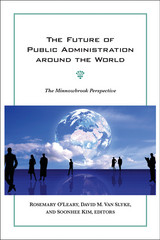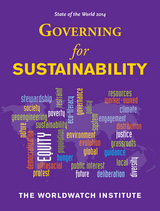
A once-in-a-generation event held every twenty years, the Minnowbrook conference brings together the top scholars in public administration and public management to reflect on the state of the field and its future. This unique volume brings together a group of distinguished authors—both seasoned and new—for a rare critical examination of the field of public administration yesterday, today, and tomorrow.
The book begins by examining the ideas of previous Minnowbrook conferences, such as relevance and change, which are reflective of the 1960s and 1980s. It then moves beyond old Minnowbrook concepts to focus on public administration challenges of the future: globalism, twenty-first century collaborative governance, the role of information technology in governance, deliberative democracy and public participation, the organization of the future, and teaching the next generation of leaders. The book ends by coming full circle to examine the current challenge of remaining relevant. There is no other book like this—nor is there ever likely to be another—in print. Simply put, the ideas, concepts, and spirit of Minnowbrook are one-of-a-kind. This book captures the soul of public administration past, present, and future, and is a must-read for anyone serious about the theory and practice of public administration.

These diverse efforts are the subject of the latest volume in the Worldwatch Institute’s highly regarded State of the World series. The 2014 edition, marking the Institute’s 40th anniversary, examines both barriers to responsible political and economic governance as well as gridlock-shattering new ideas. The authors analyze a variety of trends and proposals, including regional and local climate initiatives, the rise of benefit corporations and worker-owned firms, the need for energy democracy, the Internet’s impact on sustainability, and the importance of eco-literacy. A consistent thread throughout the book is that informed and engaged citizens are key to better governance.
The book is a clear-eyed yet ultimately optimistic assessment of citizens’ ability to govern for sustainability. By highlighting both obstacles and opportunities, State of the World 2014 shows how to effect change within and beyond the halls of government. This volume will be especially useful for policymakers, environmental nonprofits, students of environmental studies, sustainability, or economics—and citizens looking to jumpstart significant change around the world.
READERS
Browse our collection.
PUBLISHERS
See BiblioVault's publisher services.
STUDENT SERVICES
Files for college accessibility offices.
UChicago Accessibility Resources
home | accessibility | search | about | contact us
BiblioVault ® 2001 - 2024
The University of Chicago Press









